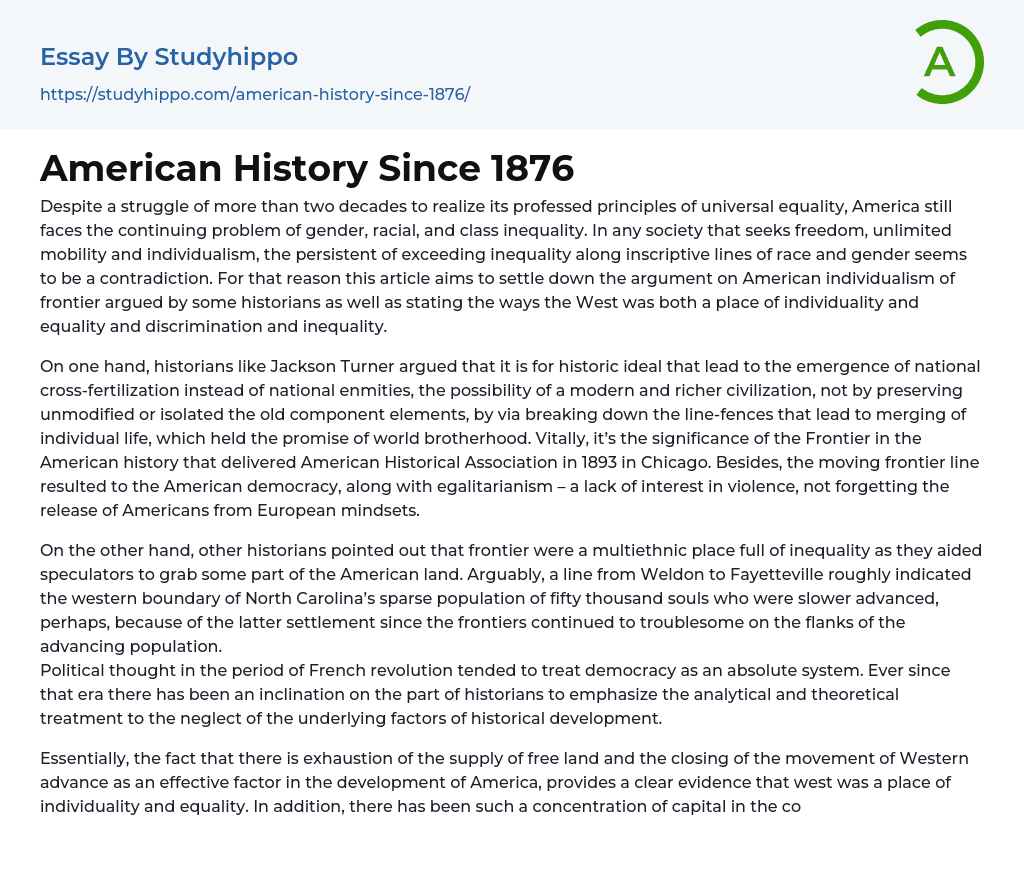Despite a struggle of over two decades to accomplish its stated objectives of universal equality, America continues to confront the persistent problem of inequality concerning gender, race, and class. In a society that esteems freedom, unrestricted mobility, and individualism, the continual existence of inequality based on race and gender seems contradictory to these values. This article aims to explore the discussion surrounding American frontier individualism as presented by specific historians and examine how the West was simultaneously characterized by both individuality and equality along with discrimination and inequality.
Historians such as Jackson Turner argued that the emergence of national cross-fertilization, rather than national enmities, was driven by a historic ideal. This ideal involved breaking down the barriers that isolated old component elements, allowing for the possibility of a modern and richer civilization. The
...merging of individual life held the promise of world brotherhood. The significance of the Frontier in American history led to the establishment of the American Historical Association in 1893 in Chicago. Moreover, the movement of the frontier line resulted in American democracy and egalitarianism, as well as a lack of interest in violence and a release from European mindsets. However, other historians pointed out that the frontier was a multiethnic place characterized by inequality, as it allowed speculators to acquire parts of American land.
It can be argued that the western boundary of North Carolina's sparsely populated area, with a population of fifty thousand people, was approximately from Weldon to Fayetteville. The slower advancement of this population may have been due to the challenging circumstances on the advancing population's flanks. During the period of the French revolution, political thought tended to view democracy as
an absolute system. Since then, historians have shown a tendency to prioritize analytical and theoretical treatment, neglecting the underlying factors of historical development. In essence, the exhaustion of available free land and the end of the movement of Western advancement in America provide clear evidence that the West was a place characterized by individuality and equality.
The economic development of the United States has experienced a modern epoch due to a concentration of capital in fundamental industries. This has resulted in the domination of a few large corporations with interconnected interests. This major shift has occurred primarily within the last decade. Despite being seen as a place of individuality and equality, the West still had its fair share of discrimination and inequality. The manorial practice of owning extensive vacant land among the colonies hindered New York's reputation as a settlement region, which even the opportunities in certain areas of the colony could not overcome. Inequality and discrimination have deep roots in America's past, particularly in the West, where a hierarchy placed White groups at the top and others at the bottom.
This suggests that certain individuals in society are willing to perform unpleasant tasks for low pay. By analyzing the contributions of the West and frontier, we can discern what was considered acceptable in the past and what should be deemed acceptable in the present. This process of altering norms and gaining approval is a slow one, but it currently appears to be a forward-thinking concept.
- Abolitionism essays
- Adam Smith essays
- American History essays
- American Revolution essays
- Ancient Egypt essays
- Articles Of Confederation essays
- Atlantic Slave Trade essays
- Aztec essays
- Benjamin Franklin essays
- Civil Rights Act of 1964 essays
- Civil Rights Movement essays
- Civil war essays
- Cleopatra essays
- French And Indian War essays
- Gettysburg essays
- Great Depression essays
- Hurricane Katrina essays
- Industrial Revolution essays
- Jamestown essays
- Manifest Destiny essays
- Mccarthyism essays
- Patrick Henry essays
- Pearl Harbor essays
- Pocahontas essays
- Prohibition essays
- Pyramids essays
- Salem Witch Trials essays
- Slavery essays
- The New Deal essays
- Thirteen Colonies essays
- Westward Expansion essays
- 1920S essays
- 1950S essays
- 1960S essays
- 19Th Century essays
- 20Th Century essays
- Ancient Greece essays
- Bravery essays
- British Empire essays
- Civilization essays
- Colonialism essays
- Declaration of Independence essays
- Evidence essays
- Genocide essays
- Gilded Age essays
- Historical Figures essays
- Historiography essays
- History of the United States essays
- Letter from Birmingham Jail essays
- Louisiana Purchase essays




